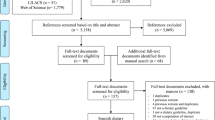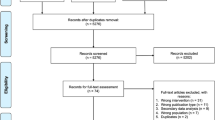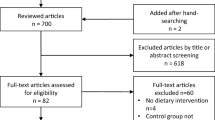Abstract
Programmes that promote dietary behaviour change for the prevention of chronic disease must include components that are rooted in best practice and associated with effectiveness. The purpose of this overview of systematic reviews was to examine the characteristics and dietary behaviour change outcomes of nutrition interventions among populations with or at risk of non-communicable chronic diseases. Systematic reviews of randomised controlled trials (RCTs) testing dietary behaviour change interventions published between January 2006 and November 2015 were identified via searches in Cochrane Library, PubMed, EMBASE and PsycINFO. Quality of reviews were appraised using AMSTAR. Dietary behaviour change and intervention details were extracted and systematically summarised. Fifteen articles met the inclusion criteria. Dietary behaviour changes in response to nutrition interventions were significant in over half of interventions. Reducing dietary fat and increasing fruits and vegetables were the most common behaviour changes. The characteristics of nutrition interventions and their relationship to effectiveness for dietary behaviour change among chronic disease or at-risk populations were reported inconsistently. However, associative evidence exists to support more frequent contacts and the use of specific behaviour change techniques. No clear relationships were found between effectiveness and intervention setting, mode of delivery or intervention provider, although some population-specific relationships were identified. Interventions that promote long-term maintenance of dietary behaviour changes are lacking in the literature. This comprehensive umbrella review identifies specific characteristics of interventions that are associated with effectiveness in interventions that promote dietary behaviour change among different at-risk populations. In order to maximise outcomes, public health, health promotion and healthcare organisations should consider these results in order to inform the development and improvement of nutrition programmes.
This is a preview of subscription content, access via your institution
Access options
Subscribe to this journal
Receive 12 print issues and online access
$259.00 per year
only $21.58 per issue
Buy this article
- Purchase on Springer Link
- Instant access to full article PDF
Prices may be subject to local taxes which are calculated during checkout

Similar content being viewed by others
References
World Health Organisation. Global status report on noncommunicable disease. Geneva: WHO; 2014.
World Cancer Research Fund/American Institute for Cancer Research. Food, nutrition, physical activity and the prevention of cancer: a global perspective. Washington DC: AICR; 2007.
Estruch R, Ros E, Salas-Salvado J, Covas MI, Corella D, Aros F, et al. Primary prevention of cardiovascular disease with a Mediterranean diet supplemented with extra-virgin olive oil or nuts. N Engl J Med. 2018;378:e34.
Greaves CJ, Sheppard KE, Abraham C, Hardeman W, Roden M, Evans PH, et al. Systematic review of reviews of intervention components associated with increased effectiveness in dietary and physical activity interventions. BMC Public Health. 2011;11:119.
Sofi F, Abbate R, Gensini GF, Casini A. Accruing evidence on benefits of adherence to the Mediterranean diet on health: an updated systematic review and meta-analysis. Am J Clin Nutr. 2010;92:1189–96.
Diabetes UK. Evidence-based nutrition guidelines for the prevention and management of diabetes. Diabet Med. 2018;35:541–47.
National Institute for Clinical Excellence. Obesity: identification, assessment and management. Clinical Guideline 189. NICE; Manchester, UK, 2014. https://www.nice.org.uk/guidance/CG189. [Accessed 24/02/2018]
National Institute for Clinical Excellence. Cardiovascular disease: risk assessment and reduction, including lipid modification. Clinical Guidance 181. NICE; Manchester, UK, 2014. https://www.nice.org.uk/guidance/CG181. [Accessed 25/02/2018]
Writing Group of the Nutrition Care Process/Standardized Language C. Nutrition care process part II: using the International Dietetics and Nutrition Terminology to document the nutrition care process. J Am Diet Assoc. 2008;108:1287–93.
Michie S, Richardson M, Johnston M, Abraham C, Francis J, Hardeman W, et al. The behavior change technique taxonomy (v1) of 93 hierarchically clustered techniques: building an international consensus for the reporting of behavior change interventions. Ann Behav Med. 2013;46:81–95.
Barry MJ, Edgman-Levitan S. Shared decision making--pinnacle of patient-centered care. N Engl J Med. 2012;366:780–1.
Michie S, Fixsen D, Grimshaw JM, Eccles MP. Specifying and reporting complex behaviour change interventions: the need for a scientific method. Implement Sci. 2009;4:40.
Muller AM, Maher CA, Vandelanotte C, Hingle M, Middelweerd A, Lopez ML, et al. Physical activity, sedentary behavior, and diet-related eHealth and mHealth research: bibliometric analysis. J Med Internet Res. 2018;20:e122.
Sahay TB, Ashbury FD, Roberts M, Rootman I. Effective components for nutrition interventions: a review and application of the literature. Health Promot Pract. 2006;7:418–27.
Shea BJ, Hamel C, Wells GA, Bouter LM, Kristjansson E, Grimshaw J, et al. AMSTAR is a reliable and valid measurement tool to assess the methodological quality of systematic reviews. J Clin Epidemiol. 2009;62:1013–20.
Janssen V, De Gucht V, Dusseldorp E, Maes S. Lifestyle modification programmes for patients with coronary heart disease: a systematic review and meta-analysis of randomized controlled trials. Eur J Prev Cardiol. 2013;20:620–40.
Avery KN, Donovan JL, Horwood J, Lane JA. Behavior theory for dietary interventions for cancer prevention: a systematic review of utilization and effectiveness in creating behavior change. Cancer Causes Control. 2013;24:409–20.
Spark LC, Reeves MM, Fjeldsoe BS, Eakin EG. Physical activity and/or dietary interventions in breast cancer survivors: a systematic review of the maintenance of outcomes. J Cancer Surviv. 2013;7:74–82.
Johnson SS, Paiva AL, Cummins CO, Johnson JL, Dyment SJ, Wright JA, et al. Transtheoretical model-based multiple behavior intervention for weight management: effectiveness on a population basis. Prev Med. 2008;46:238–46.
Jones H, Edwards L, Vallis TM, Ruggiero L, Rossi SR, Rossi JS, et al. Changes in diabetes self-care behaviors make a difference in glycemic control: the Diabetes Stages of Change (DiSC) study. Diabetes Care. 2003;26:732–7.
Mastellos N, Gunn LH, Felix LM, Car J, Majeed A. Transtheoretical model stages of change for dietary and physical exercise modification in weight loss management for overweight and obese adults. Cochrane Database Syst Rev. 2014;CD008066.
Allen JK, Dennison CR. Randomized trials of nursing interventions for secondary prevention in patients with coronary artery disease and heart failure: systematic review. J Cardiovasc Nurs. 2010;25:207–20.
Desroches S, Lapointe A, Ratte S, Gravel K, Legare F, Turcotte S. Interventions to enhance adherence to dietary advice for preventing and managing chronic diseases in adults. Cochrane Database Syst Rev. 2013;CD008722.
Lara J, Evans EH, O’Brien N, Moynihan PJ, Meyer TD, Adamson AJ, et al. Association of behaviour change techniques with effectiveness of dietary interventions among adults of retirement age: a systematic review and meta-analysis of randomised controlled trials. BMC Med. 2014;12:177.
Taylor PJ, Kolt GS, Vandelanotte C, Caperchione CM, Mummery WK, George ES, et al. A review of the nature and effectiveness of nutrition interventions in adult males--a guide for intervention strategies. Int J Behav Nutr Phys Act. 2013;10:13.
Ghisi GL, Abdallah F, Grace SL, Thomas S, Oh P. A systematic review of patient education in cardiac patients: do they increase knowledge and promote health behavior change? Patient Educ Couns. 2014;95:160–74.
Dombrowski SU, Avenell A, Sniehott FF. Behavioural interventions for obese adults with additional risk factors for morbidity: systematic review of effects on behaviour, weight and disease risk factors. Obes Facts. 2010;3:377–96.
Bhattarai N, Prevost AT, Wright AJ, Charlton J, Rudisill C, Gulliford MC. Effectiveness of interventions to promote healthy diet in primary care: systematic review and meta-analysis of randomised controlled trials. BMC Public Health. 2013;13:1203.
Siervo M, Lara J, Chowdhury S, Ashor A, Oggioni C, Mathers JC. Effects of the Dietary Approach to Stop Hypertension (DASH) diet on cardiovascular risk factors: a systematic review and meta-analysis. Br J Nutr. 2015;113:1–15.
Martinez-Gonzalez MA, Martin-Calvo N. Mediterranean diet and life expectancy; beyond olive oil, fruits, and vegetables. Curr Opin Clin Nutr Metab Care. 2016;19:401–7.
Pierce JP, Natarajan L, Caan BJ, Parker BA, Greenberg ER, Flatt SW, et al. Influence of a diet very high in vegetables, fruit, and fiber and low in fat on prognosis following treatment for breast cancer: the Women’s Healthy Eating and Living (WHEL) randomized trial. JAMA. 2007;298:289–98.
Pakiz B, Flatt SW, Mills KC, Jordan LJ, Carethers JM, Rock CL. Quality of life and diet intervention in individuals at risk for recurrence of colorectal adenomas. Psychooncology. 2005;14:85–93.
Bradbury KE, Appleby PN, Key TJ. Fruit, vegetable, and fiber intake in relation to cancer risk: findings from the European Prospective Investigation into Cancer and Nutrition (EPIC). Am J Clin Nutr. 2014;100(Suppl 1):394S–8S.
Patterson RE, Neuhouser ML, Hedderson MM, Schwartz SM, Standish LJ, Bowen DJ. Changes in diet, physical activity, and supplement use among adults diagnosed with cancer. J Am Diet Assoc. 2003;103:323–8.
Ball L, Johnson C, Desbrow B, Leveritt M. General practitioners can offer effective nutrition care to patients with lifestyle-related chronic disease. J Prim Health Care. 2013;5:59–69.
Harris J, Felix L, Miners A, Murray E, Michie S, Ferguson E, et al. Adaptive e-learning to improve dietary behaviour: a systematic review and cost-effectiveness analysis. Health Technol Assess. 2011;15:1–160.
Pagoto SL, Schneider KL, Oleski JL, Luciani JM, Bodenlos JS, Whited MC. Male inclusion in randomized controlled trials of lifestyle weight loss interventions. Obesity (Silver Spring). 2012;20:1234–9.
Pfaeffli Dale L, Dobson R, Whittaker R, Maddison R. The effectiveness of mobile-health behaviour change interventions for cardiovascular disease self-management: a systematic review. Eur J Prev Cardiol. 2016;23:801–17.
Prochaska JJ, Spring B, Nigg CR. Multiple health behavior change research: an introduction and overview. Prev Med. 2008;46:181–8.
Horodyska K, Luszczynska A, Hayes CB, O’Shea MP, Langoien LJ, Roos G, et al. Implementation conditions for diet and physical activity interventions and policies: an umbrella review. BMC Public Health. 2015;15:1250.
Aguiar EJ, Morgan PJ, Collins CE, Plotnikoff RC, Callister R. Efficacy of interventions that include diet, aerobic and resistance training components for type 2 diabetes prevention: a systematic review with meta-analysis. Int J Behav Nutr Phys Act. 2014;11:2.
Lin JS, O’Connor E, Evans CV, Senger CA, Rowland MG, Groom HC. Behavioral counseling to promote a healthy lifestyle in persons with cardiovascular risk factors: a systematic review for the U.S. Preventive Services Task Force. Ann Intern Med. 2014;161:568–78.
Aldcroft SA, Taylor NF, Blackstock FC, O’Halloran PD. Psychoeducational rehabilitation for health behavior change in coronary artery disease: a systematic review of controlled trials. J Cardiopulm Rehabil Prev. 2011;31:273–81.
World Health Organisation. Interventions on diet and physical activity: what works. Geneva: WHO; 2009.
Acknowledgements
This article was produced as part of the project ‘664258/Emp-H’, which has received funding from the European Union’s Health Programme (2014-2020).
Author information
Authors and Affiliations
Corresponding author
Ethics declarations
Conflict of interest
The authors declare that they have no conflict of interest.
Electronic supplementary material
Rights and permissions
About this article
Cite this article
Browne, S., Minozzi, S., Bellisario, C. et al. Effectiveness of interventions aimed at improving dietary behaviours among people at higher risk of or with chronic non-communicable diseases: an overview of systematic reviews. Eur J Clin Nutr 73, 9–23 (2019). https://doi.org/10.1038/s41430-018-0327-3
Received:
Revised:
Accepted:
Published:
Issue Date:
DOI: https://doi.org/10.1038/s41430-018-0327-3
This article is cited by
-
Behavioral model-guided nutritional counseling could improve the dietary practice and nutritional status of elders in Ethiopia: a quasi-experimental study
BMC Geriatrics (2023)
-
Key process features of personalized diet counselling in metabolic syndrome: secondary analysis of feasibility study in primary care
BMC Nutrition (2022)
-
Transtheoretical model-based nutritional interventions in adolescents: a systematic review
BMC Public Health (2020)
-
FoodSmart City Dublin: A Framework for Sustainable Seafood
Food Ethics (2020)
-
Nutrition knowledge and attitude in medical students of Tabriz University of Medical Sciences in 2017–2018
BMC Research Notes (2019)



